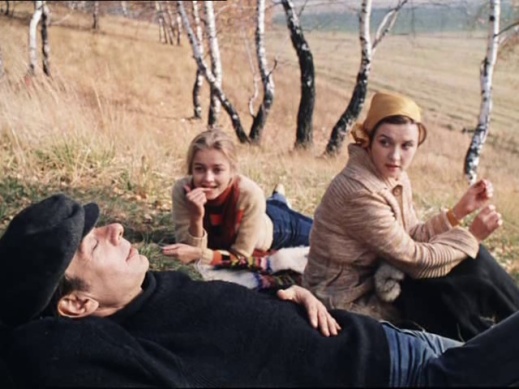10 February 2014
The film starts with the song “Aleksandra” by Tatiana and Sergey Nikitin. We know that it may have more significance than a mere opening sequence only after watching the second part of the film. Katya’s daughter is, after all, named Aleksandra. The film also ends with the same song. Although Aleksandra, herself, seems to be second to Katya’s story and all the characters from part one. Nonetheless, the director, Vladimir Men’Shov, wants us to notice her and wants us to think about her in the end.
The song goes something like “Aleksandra, this city is ours together. We have become its fate.” The song is trying to say that we are a product of our circumstances. Just as Alexandra was a passive character, so is everybody in Russia. They are products of the State, which seems to be changing every decade or two. At the beginning of the film, Alexandra seems unattached and uninterested in her mother. Her mother, Katya, always seems to be too busy working to give her much attention. Then when Gosha comes along, these circumstances change her attitude. Instead of listening to music and being closed off from the world and in doors, we see her outside, open and friendly.These circumstances seemed to have changed her for the better.
Then there is Gosha, whose circumstances gave him some distinct values. Despite being the most lovable character of the films we have watched thus far, he has one flaw: he is extremely patriarchal. He tells Katya that he would leave her if she ever raised her voice at him. He thinks that a man should always make more money than a woman. He is extremely old-fashioned. This works for him because he is such a gentleman. This does not work because the times have changed. With Perestroika, the traditional values were dissolving. Just like Katya, women everywhere were rising to power. Gosha could not deal with this and leaves Katya when he finds out where she works.
There is a bit of irony here. In part one, a non-decent man leaves her because she lies and about being rich. In part two, a good man leaves her because she lies about being poor. One of the lessons to learn here is definitely to remain open. Part one even takes place during the Great Thaw. The director wants to show the consequences of not being open; he was criticizing the State.
Back to Gosha, he decides to come back to Katya. Being a good man, he decides to adapt to the times because he loves Katya. With Gosha, the director wanted to say that as a State, we do not have to give up all of our old values. We should just give up the bad ones (such as patriarchy).
Katya is also a symbol of pardoning the State. Katya is such a good, hard-working person. Yet, she find herself in trouble when she lies. Lying does not come natural to her. She represents the State, specifically Krushev. Krushev meant the beast for his country but he was just uneducated; he was naive, just like Katya.
The different characters seem to foil the different leaders of Russia. Ludmilla could be like Breshnev, power-hungry and motivated by shiny things. In the end, though, she does not end up with much. She is still left chasing shiny things. Similarly, Breshnev lead for the glory yet hardly accomplished a thing, hence, his era is known as Stagnation.
Over all, the film reminds us that the State should work for its people because the condition of the government determines the condition of its people. On top of that, those who can adapt (like Katya and Gosha) will fare the best.
Despite his gentle critique of the State, there is no doubt that Men’Shov loves his country and sympathizes with the State, too. This is apparent in the following lines of Aleksandra: “The love for Moscow doesn’t come fast, but it is true and pure the way a mother’s love is stronger than any other.”

